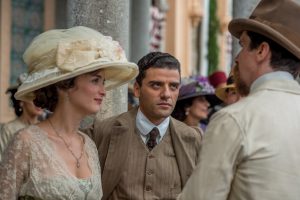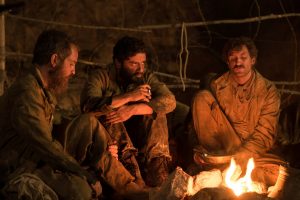![]()
It’s unfortunate when a movie attempts to tackle a serious and important issue and falls short. That’s the feeling one gets while watching the period drama, The Promise. The intent of shedding light on and garnering attention to the Armenian Genocide is certainly noble. However, packaging such an abominable event within the melodramatic framework of a slick and polished romance flick doesn’t end up gelling.
 Set in 1915 during the onset of World War I, Mikael (Oscar Isaac) is an apothecary living in a small village in Armenia. In order to achieve his dream of becoming a doctor, Mikael makes arrangements to marry a local woman. But first, he will use the dowry to pay for medical training and a degree in Constantinople. He arrives in Turkey and visits an uncle, who introduces him to Ana (Charlotte Le Bon), an Armenian raised in France as well as her boyfriend, Chris (Christian Bale), who is an American reporter writing about the conflict. Despite their relationships, Mikael and Ana begin to feel an attraction between one another. But when the Turkish government begins rounding up Armenians for “relocation”, their quest for survival takes them on different, occasionally intersecting paths.
Set in 1915 during the onset of World War I, Mikael (Oscar Isaac) is an apothecary living in a small village in Armenia. In order to achieve his dream of becoming a doctor, Mikael makes arrangements to marry a local woman. But first, he will use the dowry to pay for medical training and a degree in Constantinople. He arrives in Turkey and visits an uncle, who introduces him to Ana (Charlotte Le Bon), an Armenian raised in France as well as her boyfriend, Chris (Christian Bale), who is an American reporter writing about the conflict. Despite their relationships, Mikael and Ana begin to feel an attraction between one another. But when the Turkish government begins rounding up Armenians for “relocation”, their quest for survival takes them on different, occasionally intersecting paths.
 As mentioned, this is an impressive-looking production, with Spain standing in for Turkey and Armenia and the gorgeous backdrops colorfully lensed. While beautiful, they do add a layer of artifice to the proceedings. Still, when the film chooses to detail the atrocities committed by the Turkish forces, they are effectively chilling. The quick and brutal executions are effectively rendered, particularly during a sequence when a village is ruthlessly removed and gunned down in the woods. And Isaac makes his character likable and relatable, despite Mikael’s ill-advised actions that exist solely to move the romance forward between his character and Ana.
As mentioned, this is an impressive-looking production, with Spain standing in for Turkey and Armenia and the gorgeous backdrops colorfully lensed. While beautiful, they do add a layer of artifice to the proceedings. Still, when the film chooses to detail the atrocities committed by the Turkish forces, they are effectively chilling. The quick and brutal executions are effectively rendered, particularly during a sequence when a village is ruthlessly removed and gunned down in the woods. And Isaac makes his character likable and relatable, despite Mikael’s ill-advised actions that exist solely to move the romance forward between his character and Ana.
 One wishes that the story had focused solely on the historical events. Instead, the main plot revolves around a love triangle and the character’s liaisons. Ana struggles to decide which man she truly loves, Mikael is conflicted about moving forward because of his promise to return to his betrothed, and workaholic Chris labors with his jealously over Mikael’s and Ana’s budding relationship. There is a lot of flip-flopping back and forth as Ana spends time with each man individually, leading to doe-eyed stares and, when apart, looks of longing. It’s more than a bit corny, and the emphasis on who Ana will ultimately choose feels especially unimportant given the horrific executions occurring around them.
One wishes that the story had focused solely on the historical events. Instead, the main plot revolves around a love triangle and the character’s liaisons. Ana struggles to decide which man she truly loves, Mikael is conflicted about moving forward because of his promise to return to his betrothed, and workaholic Chris labors with his jealously over Mikael’s and Ana’s budding relationship. There is a lot of flip-flopping back and forth as Ana spends time with each man individually, leading to doe-eyed stares and, when apart, looks of longing. It’s more than a bit corny, and the emphasis on who Ana will ultimately choose feels especially unimportant given the horrific executions occurring around them.
In the end, The Promise is a polished and well-intentioned feature, but one that doesn’t quite hit the emotional or dramatic heights that it should due to its overly theatrical bent on the love lives of the characters. It’s really too bad, because the Armenian Genocide deserves more attention. At least it may inspire some viewers to find out more about the real events. In the meantime, if you’d like to see a picture that handles the subject matter more effectively, I’d suggest renting the smaller art film, Ararat (2001).


